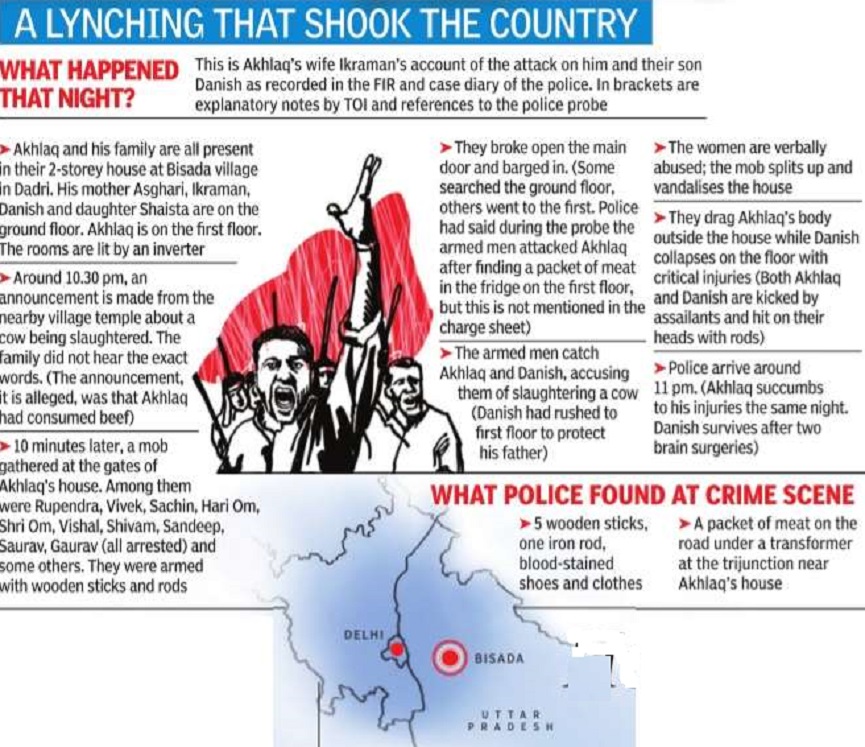Bisada, Dadri/ Akhlaq case
This is a collection of articles archived for the excellence of their content. |

The Times of India

The Times of India
The incident of Sept 28, 2015
Shafaque Alam, THIS DAY, LAST YEAR - A year passes, without trial, Sep 28 2016 : The Times of India
Bisada was retiring for the day. Nothing seemed amiss, except there was a power cut, which is usual in these parts. Then, something happened that would scar the village forever, put it at the centre of an intolerance debate that still rages. A man was battered to death in his house by a lynch mob on the suspicion that he had eaten beef. Food politics espoused by an increasingly radical right wing had claimed its first victim
A year has passed since Mohammad Akhlaq was battered to death by a lynch mob that suspected he was eating beef. Eighteen people have, during this time, been arrested, all residents of Akhlaq's village Bisada. Police have filed a 177-page case diary along with a 4-page charge sheet that contains the eyewitness account of Akhlaq's wife Ikraman in court. Yet, nine months and several hearings later, charges are yet to be framed against the suspects.
For Akhlaq's family , it's been a frustrating wait for the process of justice to begin. In the meantime, families of the suspects banded together, turned up pressure on police and the government by threatening a mahapanchayat and succeeded in starting a parallel case of cow slaughter against Akhlaq's family . The forensic report of the meat sample seized by police -first said to be mutton by the Greater Noida veterinary hospital and then beef by UP's forensic laboratory in Mathura -muddied the waters further.
What started off as a black and white case of mob murder has, a year on, thanks to a complicated investigative and judicial process, acquired multiple shades of grey . The battle for justice looks like a long and difficult one for the family of the murdered man.
Yusuf Saifi, the lawyer for Akhlaq's family, said framing of charges has been repeatedly pushed back because the defence lawyers have either sought more time, or insisted on one case paper or another and copies of the forensic report of the meat sample collected by police. In the meantime, some of the arrested suspects gave moved the Allahabad high court for bail.
“Police had not given us the forensic report of the meat sample. We moved an application in court that delayed the process by some time,“ said Sheeshpal Singh, a defence lawyer. “But then we got the report, which said it was cow meat. Police also filed the injury report of the two victims (Akhlaq and his younger son Danish) very late,“ he added.
The defence also moved an application demanding an FIR against Akhlaq's family for alleged cow slaughter based on the forensic report of the meat sample, which police say was collected from outside Akhlaq's house, from the road under a transformer at a nearby trijunction. This also delayed the process of framing charges. “All documents have now been received and we hope framing of charges will take place soon,“ Singh said.
The judge hearing the case has changed too after additional district judge Virendra Kumar Singh was promoted as special judge. Since August, additional district judge Shivani Jaiswal has taken over.
Akhlaq was murdered last September 28. Police filed the charge sheet on December 22. The suspects gave been charged for rioting (sections 147 and 148, IPC), unlawful assembly (section 149), voluntarily causing hurt (section 323), murder (section 302), attempt to murder (section 307), breach of peace (section 504), criminal intimidation (section 506), mischief (section 427) and trespassing (section 458).
Three of the suspects are minors and have received bail. Last week, Akhlaq's daughter Shaista, in a complaint to the Gautam Budh Nagar police chief, challenged the age of one of the minor suspects, alleging he was her classmate in Rana Sangram Singh Inter College in Class 10 and had reduced his age by four years to escape being tried as an adult.